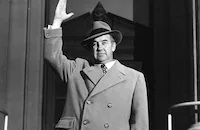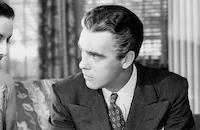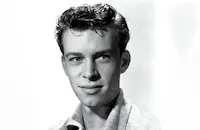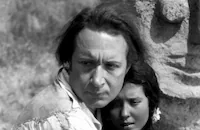The Last Posse

Brief Synopsis
Cast & Crew
Alfred Werker
Broderick Crawford
John Derek
Charles Bickford
Wanda Hendrix
Warner Anderson
Film Details
Technical Specs

Synopsis
An exhausted posse returns to the New Mexico town of Roswell two days after their departure, with aging, has-been Sheriff John Frazier gravely wounded. Judge Parker meets the posse and learns from newspaper editor Robert Emerson that the three men sought by the posse were killed, as was wealthy rancher Sampson Drune. Emerson also admits that the posse was unsuccessful in locating the money the three men stole. When a stranger asks traveling salesman Mr. Stokely about the posse, he relates the following story: Two days earlier, on Roswell's Founder's Day celebration, several townspeople remark on John's absence and speculate it is due to his habitual drunkenness. Stokely finds John sober, working quietly in his office, and invites him to the bar, where Will Romer, his brother George and son Art witness Drune conclude a major cattle deal. Bitter about the loss of their cattle the year before to Drune, who they believe cheated them, the Romers start a fight with Drune's young ward and foreman, Jed Clayton. Drune intervenes, then berates John for his inaction, causing Stokely to ask what is behind the animosity between the men. John states that Drune intentionally ruined the Romers. Later, Drune picks up a large amount of money at the hotel, and outside of the bank, Emerson and the city leaders ask Drune if he will consider investing part of the money in Roswell businesses, but he flatly refuses. Inside the bank, which has been opened privately for Drune on the town holiday, the Romers lie in wait and, seizing the money, flee. Jed gives chase in a wagon, which breaks down at the river outside town. Back in town, Drune organizes a posse and demands that the now drunken John deputize them. Emerson and the Citizen Committee demand to go along and Drune grudgingly agrees. Back in the present, Stokely concludes his explanation, then in the hotel lobby, Jed listens as Emerson recounts to various townspeople what occurred after the posse left Roswell: Drune divides the posse up and with Emerson's party, heads toward the Mexican border. Soon after, John, although ailing, catches up with them and by evening has recovered. After night falls, Drune and Jed try to abandon the posse, but John anticipates this and prevents them from going. The next day the posse is abruptly caught in a violent windstorm, which John guides them through. When the men dig themselves out after the storm dies down, they discover Drune and Jed missing and the pack mule with all their supplies gone. John tells the men that Drune took the pack mule to force them to turn back, but when Emerson expresses doubt, John reveals that Drune intends to kill the Romers because fifteen years earlier they witnessed Drune kill Jed's father, but have been terrified to testify against Drune. He adds that he cannot prove the murder and that Jed knows nothing about Drune's action as John has intentionally waited all these years for the proper moment to tell him. The men hasten after Drune with John riding ahead. When John finds Drune, the cattleman viciously attacks him, but John restores order as the others arrive. Then Drune spots the Romers ahead. In the present, Emerson concludes his explanations, claiming that the posse then cornered the Romers in a dead-end canyon and when they resisted, killed them after they shot Drune. Upstairs in a hotel room, John lies unconscious, and Emerson and the others make inquiries with the doctor, who is pessimistic about John's survival. As the men return downstairs to make statements to Judge Parker, Jed expresses anger and confusion, but one of the men insists he stick with the statement that they had agreed upon earlier. In his room John awakens abruptly and finds Stokely, who tells him the others are about to make their statements that the Romers killed Drune and before dying he made an oral will leaving everything to Jed. John sends Stokely for the doctor, then rises painfully and dresses and descends to the hotel lobby just as Jed is about to testify. John sits and after a moment's hesitation, Jed reveals that he killed Drune, then describes what happened after the posse found the Romers: Cornered, the Romers escape on foot up the steep mountainside, with Drune, Jed and John in pursuit. John pleads with the Romers to surrender and after George accidentally falls to his death, Will agrees. Just as Will and Art descend to John and turn over the satchel of money, Drune appears and shoots the Romers, which stuns Jed. John then reveals the truth to Jed about his father, Drune and the Romers. Drune attempts to shoot John, but Jed intervenes. John is still shot twice before Jed shoots Drune. When Emerson and the men arrive, Emerson suggests that they take the money and Jed can have Drune's property. In the present, Judge Parker praises Jed for his courageous confession and informs Emerson and the others that they will be prosecuted. When the judge turns to thank John, however, they discover that he is dead.

Director

Alfred Werker
Cast

Broderick Crawford

John Derek

Charles Bickford
Wanda Hendrix

Warner Anderson
Henery Hull

Will Wright

Tom Powers
Raymond Greenleaf

James Kirkwood
Eddy Waller

Skip Homeier
James Bell
Guy Wilkerson
Mira Mckinney
Helen Wallace
Harry Hayden

Monte Blue
Rita Conde
Frank Hagney
Frank Ellis

Paul Maxey
Eugene White
Reed Howes
Frank Scannell
Franklyn Farnum
Stanley Blystone
Bud Post
Terry Wilson
Crew
Connie Lee Bennett
Connie Lee Bennett
Seymour Bennett
Seymour Bennett
George Brooks
Harry Joe Brown
Jack Corrick
Lambert Day
Ross Dimaggio
Kenneth Gamet
Burnett Guffey
Gene Havlick
Frank [a.] Tuttle

Film Details
Technical Specs

Articles
The Last Posse
The Last Posse was written by husband and wife team Seymour and Connie Lee Bennett, working with veteran screenwriter Kenneth Gamet, who cut his movie-writing teeth on Nancy Drew mysteries as well as action films such as Flying Tigers (1942), Flying Leathernecks (1951) and Wake of the Red Witch (1948). Producer Harry Joe Brown started in silent movie Hollywood as a writer and cinematographer, and continued his career as a director and producer until the late 1960s. He worked in every possible genre and for an assortment of studios with such notable classics as Captain Blood (1952), Johnny Apollo (1940), Down Argentine Way (1940), and many others on his resume. Starting in the late 1950s he began to concentrate on Westerns including several highly acclaimed titles from Columbia - Ride Lonesome (1959), The Tall T (1957), Buchanan Rides Alone (1958), and others directed by Budd Boetticher and starring Randolph Scott. The Last Posse director Alfred L. Werker was also a long-time Hollywood veteran, working his way up from assistant direction of silent films to directing more than fifty films during his career, including The Adventures of Sherlock Holmes (1939), He Walks by Night (1948) and even a late Laurel and Hardy comedy A'Haunting We Will Go (1942).
The most impressive aspect of The Last Posse is its impeccable cast. Star Broderick Crawford won the Academy Award for Best Actor just a few years previously in 1949 for his role in All the King's Men and had a smash hit with the 1950 comedy Born Yesterday, but had slipped back into character roles and even some television work in the early fifties. Reportedly his real-life personality mirrored some of the rougher, tougher aspects of many of his parts, and it was this reputation for being difficult that evidently kept him from landing more lead roles. However, Crawford achieved true pop culture fame with his foray into television as Chief Dan Mathews on Highway Patrol, which ran from 1955 to 1959 and continued in heavy syndication during the 1960s. His gruff presence in that no-nonsense police actioner--call it Dragnet on wheels--gave him tremendous cachet with the TV generation and he appeared frequently on the tube until his death in 1986.
Handsome co-star John Derek began his career in the late 1940s; later he became somewhat of an auteur, writing, directing, and photographing several of his own films in the eighties. He also earned a reputation as the husband of beautiful women, Ursula Andress, Linda Evans and Bo Derek among them. Charles Bickford, playing the role of the greedy cattle baron in The Last Posse, was a distinguished actor who had been in Hollywood since the 1930s and who had garnered three Best Supporting Actor Oscar® nominations. His intelligent presence was a highlight of many films throughout the years, including The Song of Bernadette (1943), the Judy Garland version of A Star Is Born (1954), The Big Country (1958), Johnny Belinda (1948) and many others. Lovely leading lady Wanda Hendrix never became a top name, but was a lovely addition to many films, possibly achieving her greatest fame thanks to her brief marriage to World War II military mega-hero-turned-actor Audie Murphy in 1949. The rest of the cast was made up of skilled character actors including Henry Hull, former child actor Skip Homeier, Warner Anderson, and the prolific Will Wright, whose screen and TV appearances numbered close to two hundred over his relatively brief twenty-year acting career.
One of the most striking elements of The Last Posse is its crisp, evocative black and white photography, thanks to veteran cinematographer Burnett Guffey who started his career during the silent era and made distinguished contributions to over a hundred films during his career. Only a year after The Last Posse, Guffey received an Oscar® for his work on From Here to Eternity (1953), and he would go on to earn three more Academy Award nominations--The Harder They Fall (1956), Birdman of Alcatraz (1962) and King Rat (1965)--and another win for his stunning work on Bonnie and Clyde in 1967.
Nowhere was Burnett Guffey's talent more in evidence than in The Last Posse sequences filmed at and around Lone Pine, a California mountain and desert location that had long been a favorite of movie companies looking for a suitably atmospheric backdrop for their productions. Originally a small town catering to the needs of local miners, Lone Pine--situated close to Mt. Whitney, the highest peak in the lower 48 States, and the scenic Mammoth Lakes area--is a High Sierra jewel with 360 degree vistas. Better yet for film producers, it's within easy driving distance of Hollywood. The most memorable natural features, perhaps, are the unusual rock formations of the nearby Alabama Hills, huge dramatic outcroppings of oxidized stone, worn by millennia of erosion, whose sometimes jagged, sometimes strangely rounded peaks have been immortalized in hundreds of features films and television shows. The vast expanses of stark desert landscape were perfect for Westerns, too, and when photographed by a master cinematographer like Burnett Guffey for The Last Posse, add much to the movie's grim melodrama. At one time there was also a nearby ranch with several appropriate movie sets including a mission, a Western street and all the horses and wagons any visiting Hollywood filmmaker could desire. The Lone Pine area is still an ideal tourist attraction for movie buffs, and the town also hosts the annual Lone Pine Film Festival every fall, honoring Westerns and Western stars who helped put the tiny town on the map.
The Last Posse is also noted for being set in a real place of some notoriety. Just six years after the outer space aliens possibly came calling in 1947, the writers of The Last Posse used Roswell, New Mexico, as the town in the movie. Now, we can't promise little green men or flying saucers buzzing the Lone Pine skyline, but if you'll settle for frontier mendacity, lots of gunplay, and an intelligent screenplay, The Last Posse is out of this world.
Producer: Harry Joe Brown
Director: Alfred L. Werker
Screenplay: Seymour Bennett, Connie Lee Bennett, Kenneth Gamet
Cinematography: Burnett Guffey
Film Editing: Gene Havlick
Cast: Broderick Crawford (Sheriff John Frazier), John Derek (Jed Clayton), Charles Bickford (Sampson Drune), Wanda Hendrix (Deborah), Warner Anderson (Robert Emerson), Henry Hull (Stokely).
BW-73m.
by Lisa Mateas

The Last Posse
Quotes
Trivia
Notes
The working title of the film was Posse. Husband and wife writers Seymour Bennett and Connie Lee Bennett were credited onscreen as "Seymour and Connie Lee Bennett." Raymond Greenleaf's character, "Mr. Hagen," is referred to in the film as both "Arthur" and "Al."

Miscellaneous Notes
Released in United States Summer June 1953
Released in United States Summer June 1953














